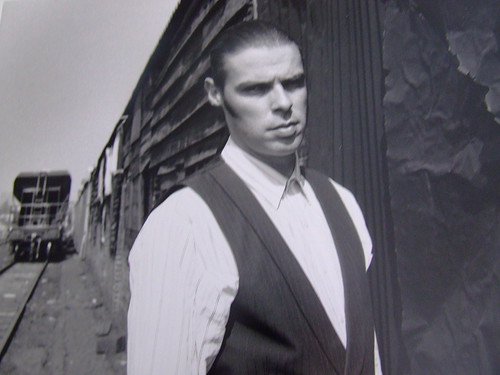“Funk” music is forever branded as kitsch and “retro” in our pop culture, and that’s a damn shame.
Given that such music is the foundation for so much contemporary and so-called “futuristic” dance music, funk has an intrinsic timelessness. Ditch the “wonka, wonka” guitar licks, the stereotypical Blaksploitation and 70’s porn stereotypes, and all of the Me Decade’s schlock, and the music has tremendous power. “Heavy-funk,” which strips the music down to pure minimalist groove – as heard from The Meters, James Brown, and Sly Stone, to name too few – is arguably the best incarnation of how the music shoots directly into the body and soul with fewer chords than punk and enough breakbeats to supply hip-hop, jungle, and house DJs for decades. In short, heavy-funk can be pure hypnosis. Listening to the first few meters and the opening snare snap of the Meters’ “The Handclapping Song” is enough to do the job for me. The work of recent “heavy-funk” revivalists such as Sugarman Three, Breakestra, the Poets of Rhythm, and Sharon Jones and the Dap-kings faithfully swing that therapist’s watch and retain the soul without succumbing to telling the music as a punchline that befell to the music in Hollywood and Baby Boomer “what were we thinking back then?” kitsch.
Here comes The Budos Band, walking off a Staten Island ferry and armed with chops they sharpened after school at a community center. There is no amateurishness here; their instrumentals could’ve been performed in 1970 as much as 2005. The 11-piece ensemble’s eponymous debut album, recorded in just three nights, is one of this year’s best dance records, embodying funk’s best elements and keeping the mind locked in their hands throughout most of its too-brief 37 minutes. Although their take on heavy-funk is certainly up there with their label mates on Brooklyn’s Daptone, namely the Sugarman Three and Sharon Jones, they also enrich their attack with deft afro-beat dynamics and hornwork. The sound is equal parts Meters and Fela Kuti as the band follows a simple, cowbell-driven cadence and let the brass sing. The psych tip that graces their guitar melodies, their flute’s trails of echo and tribal rhythms that can lead any Pied Piper march from the club and onto the streets, only augment these touchstones.
Opener, “Up From the South” begins with a “she loves me/she loves me not” bassline. The Afro-funk percussion then struts in, while the brass section and organ riffs all announce the band’s name loud enough to be heard across three states. The following “T.I.B.W.F.” has a stronger groove with a grouchy baritone sax stamping its feet after what seems to be a pitiful breakup as the brasses follow it and repeatedly shout “get over it, dammit!” But even with the raucousness of it all, the trumpet solo is calm, placing an arm on the Romeo’s shoulder. Elsewhere, the band revives Fela’s ghost in the brilliant space out trance of “Eastbound,” and steadily glides through the Latin funk of “Monkey See, Monkey Do.” They later begin “King Charles” with them laughing at a member’s shoddy impression of a monarch before they pepper out a groove akin to an after-hours nap on the last subway train of the night, watching the streetlights dance across the window.
Unfortunately, a few of the slow groove pieces tend to walk in circles. The Budos are at their best when chasing a beat like frenetic but calming “Budos Theme,” and are able fuel themselves enough to launch far into the sky with just three notes in “The Volcano Song.” They amazingly improve on a funk classic in their cover of Sly and the Family Stone’s everyman hedonism of “Sing a Simple Song.” Their full 11-piece orchestration and three-dimensional production all sound like the song is being heard through the walls of a Garden of Eden that grows in Staten Island.
Link This Release
Site Oficial:
http://www.thebudos.com/
Budos Band, The – The Budos Band
Label:Daptone Records
Catalog#:DAP-005
Format:Vinyl, LP, Album
Country:US
Released:2005
Genre:Funk / Soul
Style:Funk
Tracklist
A1 Up From The South 3:26
A2 T.I.B.W.F. 2:40
A3 Budos Theme 3:09
A4 Ghost Walk 2:13
A5 Monkey See, Monkey Do 6:01
B1 Sing A Simple Song 3:18
Written-By – S. Stewart*
B2 Eastbound 3:43
Written-By – B. Profilio*
B3 Aynotchesh Yererfu 3:13
Written-By – S. Belay*
B4 King Charles 3:09
Written-By – M. Irwin* , N. Sugarman*
B5 The Volcano Song 2:50
Written-By – A. Green* , M. Deller*
B6 Across The Atlantic 3:28
Credits
Art Direction – Samuel Tresser
Bass Guitar – Daniel Foder
Cabasa – Johnny Griggs
Congas – Duke Amayo
Congas, Bongos – Rob Lombardo
Cowbell, Claves, Tambourine – Dame Rodriguez
Design [Sleeve Design] – Ann Coombs
Drums – Brian Profilio
Drums, Congas – John Carbonella Jr.
Electric Guitar – Thomas Brenneck
Executive Producer – Roth , Sugarman
Flute – Daisy Sugarman
Mastered By – Don Grossinger
Mixed By – Gabriel Roth , Tomás Biosh
Organ – Mike Deller
Photography [Cover Photo] – Jim Sugar
Producer – Bosco Mann , TNT*
Recorded By – Gabriel Roth
Rhythm Guitar, Cowbell, Congas – Bosco Mann
Saxophone [Baritone] – Jared Tankel
Saxophone [Tenor], Tambourine – Neal Sugarman
Shekere – Vincent Balestrino
Trumpet [1st] – Andrew Greene
Trumpet [2nd] – Michael Irwin
Written-By – B. Mann* (tracks: A4, B6) , D. Foder* (tracks: A1 to A3, B4, B5) , J. Tankel* (tracks: A2, A3, B2) , T. Brenneck* (tracks: A1 to A5, B2, B4, B6)
Notes
Recorded and Mixed at DAPTONE STUDIOS, Bushwich, Brooklyn.
Link Original





















